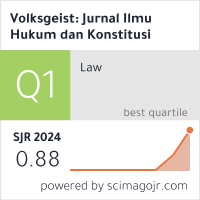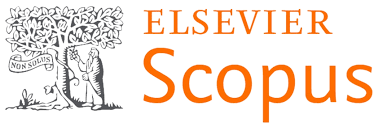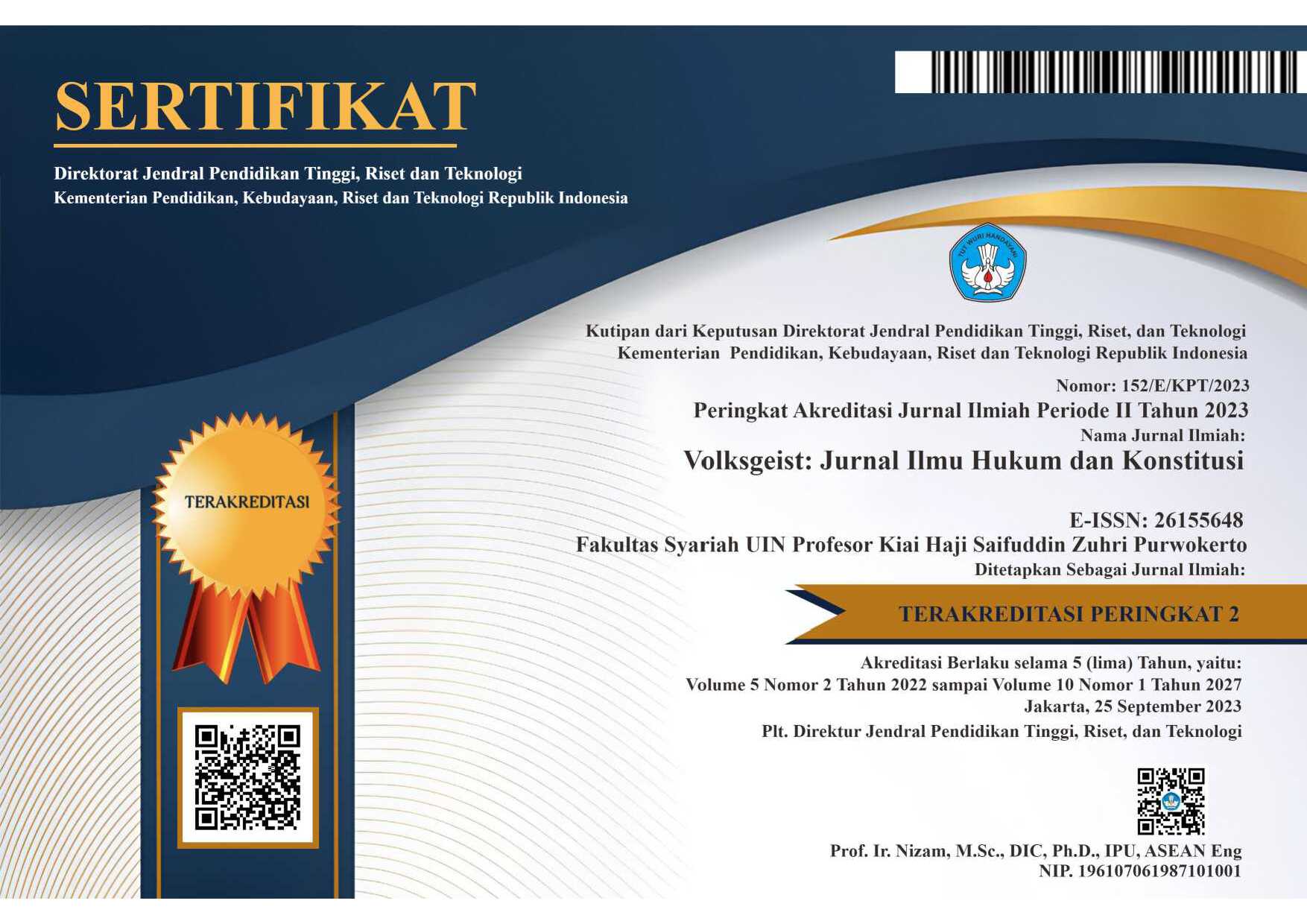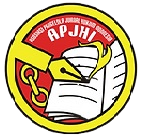Democratic Values in Nagari: An Analysis on Electoral System Shifts in One Province of Indonesia
DOI:
https://doi.org/10.24090/volksgeist.v7i2.12106Keywords:
Local democracy; representative; electoral regulation.Abstract
The Nagari system, a traditional form of regional government in Minangkabau, has historically employed a direct election method that empowers community members to elect their leaders. This model of participation aligns with the democratic values enshrined stated in the 1945 Constitution and the principles of human rights. However, a 2018 regulation altered this process, transitioning the selection of Nagari leaders from direct community engagement to an indirect election facilitated by the Nagari Traditional Council (KAN). This change was justified as a means to prevent the election of leaders who do not reflect the community’s values. This article seeks to identify the most effective democratic framework for village communities, particularly Nagari societies. The primary issue at hand is the shift from direct democracy to representative democracy in the election of Nagari leaders, instigated by Regional Regulation Number 7 of 2018. Utilizing normative legal research methods, this study emphasizes that the new regulation risks undermining democratic values by restricting direct voter engagement. The findings suggest that these modifications to the electoral process weaken the foundational principles of democracy in Nagari by curtailing direct community participation, a vital aspect of local governance and social cohesion. Therefore, it is essential to reevaluate these regulations to safeguard the democratic rights and participatory traditions of the Nagari community, ensuring alignment with constitutional principles of direct democracy and comprehensive citizen involvement.Downloads
References
Afdhal, Afdhal. “An Examination of Traditional Customs in Minangkabau Leadership Tradition: Continuity and Changes in the Modern Era.” Publicus : Jurnal Administrasi Publik 1, no. 2 (2023): 119–34. https://doi.org/10.30598/publicusvol1iss2p119-134.
Arsil, Fitra; Mohammad Novrizal, Ryan Muthiara Wasti; Yunani Abiyoso, Ali Abdillah. “Praktik Demokrasi Modern Dalam Pemerintahan Nagari Di Minangkabau.” Arena Hukum 15, no. 3 (2022): 610–29. https://doi.org/https://doi.org/10.21776/ub.arenahukum.2022.01503.8.
Asmarudin, Imam, Mohammad Fauzan, Abdul Aziz Nasihuddin, Riris Ardhanariswari, Hariyanto Hariyanto, and Bhanu Prakash Nunna. “Initiating the Reform of Principle Norms in the Formation of Laws in Indonesia.” Jurnal IUS Kajian Hukum Dan Keadilan 12, no. 2 (August 19, 2024): 208–26. https://doi.org/10.29303/IUS.V12I2.1390.
Azwar, Welhendri, Hasanuddin Hasanuddin, Muliono Muliono, Yuli Permatasari, Mufti Ulil Amri, and Yurisman Yurisman. “The Models of Nagari Indigenous Governments in West Sumatra.” Jurnal Bina Praja 12, no. 1 (2020): 33–42. https://doi.org/10.21787/jbp.12.2020.33-42.
Cahyono, Heru. “Arah Perkembangan Demokrasi Di Perdesaan Pasca Orde Baru.” Masyarakat Indonesia 38, no. 2 (2012): 351.
Fauzana, Rusyda. “Makna Nagari Sebagai Representasi Sistem Desentralisasi Bagi Masyarakat Minangkabau.” INA-Rxiv, no. 32 (2019): 6–10.
Hakimy, Idrus Dt. Rajo Penghulu. Rangkaian Mustika Adat Basandi Syarak Di Minangkabau. Bandung: Remaja Rosdakarya, 2004.
Hariyanto, Hanif Fudin, Muhammad Fauzan, Kadar Pamuji, and Tedi Sudrajat. “The Communal Democracy of Yogyakarta Special Region’s Government on the Islamic Law Eclecticism Perspective.” AL-IHKAM: Jurnal Hukum & Pranata Sosial 18, no. 1 (June 30, 2023): 200–221. https://doi.org/10.19105/AL-LHKAM.V18I1.7403.
Hariyanto, Hariyanto. “Hubungan Kewenangan Antara Pemerintah Pusat Dan Pemerintah Daerah Berdasarkan Negara Kesatuan Republik Indonesia.” Volksgeist: Jurnal Ilmu Hukum Dan Konstitusi 3, no. 2 (December 29, 2020): 99–115. https://doi.org/10.24090/VOLKSGEIST.V3I2.4184.
Helbing, Dirk, Sachit Mahajan, Regula Hänggli Fricker, Andrea Musso, Carina I. Hausladen, Cesare Carissimo, Dino Carpentras, et al. “Democracy by Design: Perspectives for Digitally Assisted, Participatory Upgrades of Society.” Journal of Computational Science 71, no. March (2023): 102061. https://doi.org/10.1016/j.jocs.2023.102061.
Hikmawan, M. Dian. “Consensual Democracy: A Challenge for Differentiated Citizenship.” International Journal of Innovation, Creativity and Change 11, no. 2 (2020): 380–96.
Janah, Kharisatul, Siti Fatimah, and Hajar Salamah Salsabila Hariz. “The Role of Aceh Local Parties in The 2024 General Election in Realizing Democratization.” Volksgeist: Jurnal Ilmu Hukum Dan Konstitusi 6, no. 1 (June 2023): 33–47. https://doi.org/10.24090/volksgeist.v6i1.7532.
Khairani, Sri Arnetti, and Fikri Hasan. “The Implementation of Competency Development of State Civil Apparatus in the Framework of Fulfilling the Rights of Civil Servants in West Sumatra Province.” Jurnal IUS Kajian Hukum Dan Keadilan 11, no. 1 (2023): 176–95. https://doi.org/10.29303/ius.v11i1.1210.
M.S. Dt. Rajo Penghulu. Bahasa Orang Cerdik Pandai Minangkabau. Padang: Koperasi Bung Hatta Offset, 1991.
MIPI. “Masyarakat Ilmu Pemerintahan Indonesia,” n.d.
Mukhlis, Muhammad Mutawalli, Maskun Maskun, Muhammad Saleh Tajuddin, Jamal Aslan, Hariyanto Hariyanto, and Hotlan Samosir. “Regional Autonomy System: Delegation of Authority and Power of Regional Government in Indonesia in the Study of Fiqh Siyasah.” Al-Istinbath: Jurnal Hukum Islam 9, no. 2 (September 30, 2024): 505–26. https://doi.org/10.29240/JHI.V9I2.9709.
Mukhlis, Muhammad Mutawalli, Achmad Ruslan, A. M. Yunus Wahid, Anshori Ilyas, and Harlida Abdul Wahab. “Ius Constituendum Regulates the Cadre-Based Recruitment of Candidates for Members of the House of Representatives Through Political Parties.” Volksgeist: Jurnal Ilmu Hukum Dan Konstitusi 7, no. 1 (2024): 139–55. https://doi.org/10.24090/volksgeist.v7i1.10830.
Mukhlis, Muhammad Mutawalli, Harlida Abdul Wahab, Zulhilmi Paidi, Nila Sastrawaty, and Haslinda Hasan. “Heavy Parliamentary v. Heavy Executive: Ambiguity of Power in Indonesian Constitutional Practices.” Jurnal Media Hukum 31, no. 2 (July 8, 2024): 186–205. https://doi.org/10.18196/JMH.V31I2.21703.
Naim, Mochtar. Nagari versus Desa: Sebuah Kerancuan Struktural. Padang: Genta Budaya, 1990.
Palullungan, Liberthin, Lisma Lumentut, and Zainal Amin Ayub. “Reconstruction of The Vice Regent’s Position in Optimization of Regional Autonomy: Realizing Democratic and Justice Values.” Jurnal IUS Kajian Hukum Dan Keadilan 11, no. 2 (2023): 282–91. https://doi.org/http://dx.doi.org/10.29303/ius.v11i2.1235.
Prima, Afdhal, H SD Zaili Rusli, MSi Jurusan Ilmu Administrasi Negara, and Prodi Administrasi Negara. “SISTEM PEMERINTAHAN NAGARI ( STUDI PADA NAGARI PADANG MAGEK KABUPATEN TANAH DATAR ) Oleh.” Jom FISIP 1, no. 2 (2014): 1.
Robet, Robertus, Meila Riskia Fitri, and Marista Christina Shally Kabelen. “The State and Human Rights under Joko Widodo’s Indonesia.” Cogent Social Sciences 9, no. 2 (2023). https://doi.org/10.1080/23311886.2023.2286041.
Sari, Avid Leonardo, and Ali Anwar Yusuf. “Cultural Navigation and Multiple Roles: Study of Adaptation of Minangkabau People in Overseas Land in the Perspective of the Proverb ‘Nan Sakuduang Jadi Saruik, Nan Salapeh Jadi Kambang.’” Influence: International Journal of Science Review 5, no. 2 (2023): 419–25. https://doi.org/10.54783/influencejournal.v5i2.170.
Sirajuddin, Sirajuddin, Febriansyah Ramadhan, and Ilham Dwi Rafiqi. “Urgensi Pemisahan Penyelenggaraan Pemilihan Umum Serentak Nasional Dan Lokal.” Volksgeist: Jurnal Ilmu Hukum Dan Konstitusi 4, no. 2 (2021): 221–32. https://doi.org/10.24090/volksgeist.v4i2.5232.
Tegnan, Hilaire. “Legal Pluralism and Land Administration in West Sumatra: The Implementation of the Regulations of Both Local and Nagari Governments on Communal Land Tenure.” The Journal of Legal Pluralism and Unofficial Law 47, no. 2 (May 2015): 312–23. https://doi.org/10.1080/07329113.2015.1072386.
Triputro Widodo and Supardal. Pembaharuan Otonomi Daerah. Yogyakarta: AMD Press, 2005.
Valentina, Tengku Rika, Roni Ekha Putera, and Irawati Irawati. “Reversing Democracy: Examining the Nagari Institution in West Sumatra, Indonesia.” Bisnis & Birokrasi Journal 26, no. 1 (2019). https://doi.org/10.20476/jbb.v26i1.10084.
Vel, J A C, and A W Bedner. “Decentralisation and Village Governance in Indonesia: The Return to the Nagari and the 2014 Village Law.” The Journal of Legal Pluralism and Unofficial Law 47, no. 3 (September 2015): 493–507. https://doi.org/10.1080/07329113.2015.1109379.
Wendra, Yunaldi. “Democracy ‘Character’ Local Wisdom Building Democratic Political Awareness of Character ‘Akal Budi’ Autentik Indonesia: A Study From Experience of Governance System of Republic of Nagari in West Sumatera.” UNTAG Law Review 2, no. 2 (2018): 156–68. https://doi.org/http://dx.doi.org/10.56444/ulrev.v2i2.922.
Widodo, Triputro dan Supardal. Pembaharuan Otonomi Daerah. Yogyakarta: APMD Press, 2005.
Yani, Ahmad. “Penataan Pemilihan Kepala Desa Dalam Sistem Ketatanegaraan Di Indonesia.” Jurnal Konstitusi 19, no. 2 (2022): 456. https://doi.org/10.31078/jk1929.
Yunaldi, Wendra. Nagari Dan Negara: Perspektif Otentik Kesatuan Masyarakat Hukum Adat Dalam Ketatanegaraan Indonesia, by Wendra Yunaldi. Bijdragen Tot de Taal-, Land- En Volkenkunde / Journal of the Humanities and Social Sciences of Southeast Asia. Vol. 180, 2024. https://doi.org/10.1163/22134379-18001008.
Downloads
Published
How to Cite
Issue
Section
License
Copyright (c) 2024 Meri Yarni, Adeb Davega Prasna, Yetniwati Yetniwati, Beny Saputra

This work is licensed under a Creative Commons Attribution-ShareAlike 4.0 International License.
Copyright Notice
Authors who publish with this journal agree to the following terms: Authors retain copyright and grant the journal right of first publication with the work simultaneously licensed under a Creative Commons Attribution-ShareAlike 4.0 International License that allows others to share the work with an acknowledgment of the work's authorship and initial publication in this journal.











